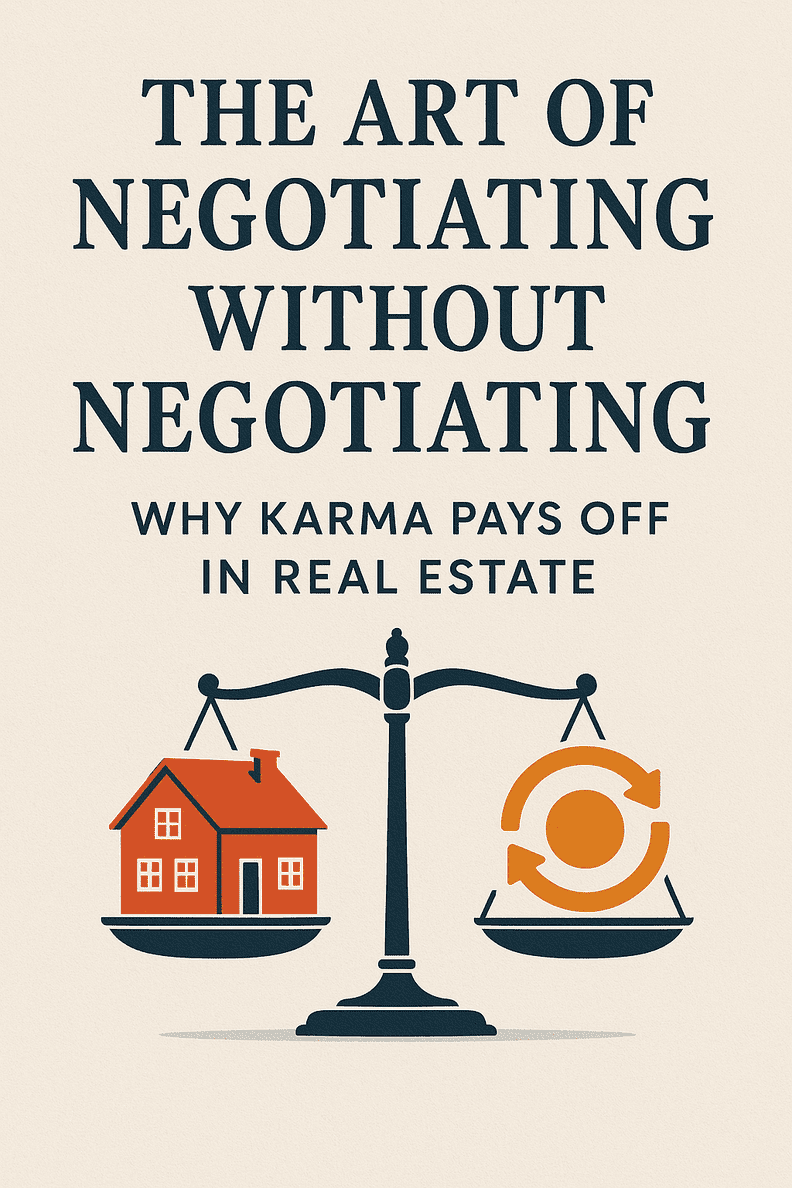
The Art of Negotiating Without Negotiating: Why Karma Pays Off in Real Estate
By Jorge Vazquez, CEO of Graystone Investment Group
Hey everyone, it’s Jorge here from Graystone Investment Group—where you invest, and we do the rest.
Let me share something that might flip your thinking a bit.
Today, we’re diving into a powerful mindset that’s helped me win long-term in this business—negotiating without negotiating.
Sounds strange, right? Let me break it down for you.
This isn’t about giving up your power or being a pushover.
It’s actually the opposite—it’s about playing the long game, building relationships, and creating leverage through something most investors overlook: karma.
Let’s talk about what it looks like in real life—and why it works better than old-school hardball negotiating.
When I Meet a New Vendor, I Don’t Start with “Let’s Make a Deal”
Anytime I meet a new vendor—whether it’s an electrician, a plumber, a GC, or even someone doing minor repairs—I don’t start by beating them up on price.
Nope. I let them give me their quote. I don’t flinch. I don’t say, “That’s too high,” or “Can you do it for less?” I say, “Okay, thank you.”
Why?
Because in this business, trust and respect go farther than saving $200 on a water heater install.
I’ve been doing this long enough to know: if you show people respect up front, they remember that when you need a favor later.
The Power of Delayed Negotiation
Here’s what most people don’t get:
When you negotiate too early, especially on the first job, you often lose long-term value. That’s because the person you’re negotiating with doesn’t know you. They don’t owe you anything. You haven’t earned their loyalty. So what happens?
-
They might give you a small discount… but rush the job.
-
They might take another gig if it pays better.
-
They might say “yes” to your price but disappear when things get hard.
And you know what you end up with? Headaches. Redos. Missed timelines. Angry clients.
Instead, I take a different approach: I pay fairly at the beginning, and I build the relationship.
Then, when I really need something—fast, cheap, last-minute—I have the leverage to ask.
And 9 times out of 10, they say:
“Jorge, for you? No problem.”
That’s the real negotiation power.
What Does “Negotiating Without Negotiating” Look Like?
Let me give you an example.
Let’s say I’m flipping a house and need a new vendor to install flooring. I don’t say, “Hey, can you beat this other guy’s price?” I let them give me their quote.
Now, maybe their price is $400 more than someone else’s.
If they do good work, show up on time, clean up after themselves, and communicate well—I pay it. Why? Because now I know they’re dependable. And more importantly, they know I’m dependable too.
Fast forward a few weeks—I have a surprise job. Maybe a burst pipe or a last-minute repair before closing. Guess who’s going to pick up the phone when I call? That vendor.
And guess who’s going to cut me a deal without me even asking?
That vendor.
That’s negotiating… without negotiating.
Why This Works: Karma + Consistency = Leverage
Let’s get real here. We all want to save money. We all want to get good deals. But the truth is, good deals come from good relationships.
And relationships don’t start with a discount—they start with mutual respect.
You see, when you treat vendors fairly from Day 1:
-
They feel safe working with you.
-
They’re more likely to go above and beyond.
-
They prioritize your projects.
-
They offer you discounts later—because they want to keep you happy.
It’s karma. But in real estate terms, I call it relationship equity.
You’re building value, not just in your projects—but in your network.
Most People Negotiate Wrong
Here’s where most investors mess this up. They:
-
Try to get the lowest possible bid right away.
-
Threaten to use someone else.
-
Treat vendors like they’re replaceable.
And yeah, maybe they save a few hundred bucks up front. But then:
-
The vendor flakes out halfway through the job.
-
The quality is garbage.
-
They disappear when you need them most.
So they end up spending more time and money fixing the mess—or worse, losing deals because of delays.
That’s the gamble. And it’s not worth it.
What Happens When You Don’t Negotiate Right Away
Let me tell you what happens when you show trust and patience up front:
-
You build loyalty.
Vendors remember clients who treat them with respect. -
You build a go-to team.
These are the people who show up at 7am with no questions asked. -
You gain leverage over time.
Because when you really need something—extra fast, extra cheap—they know you’re not always asking for favors. So when you do ask, they’re more likely to say yes. -
You reduce stress.
You’re not chasing people down, replacing crews, or redoing jobs. That peace of mind is priceless.
What This Looks Like After 20+ Years
After managing hundreds of rehabs, flips, and rentals, I’ve built a network of vendors who love working with us at Graystone. Why? Because we treat them like partners, not pawns.
I’ve paid higher prices up front, knowing I’d earn back the difference in long-term trust.
Now, when I need something in a crunch, my guys move mountains.
That’s the secret sauce most investors don’t talk about.
This Applies to More Than Just Contractors
This mindset goes beyond vendors. It works with:
-
Tenants – Show respect, and they’ll often stay longer and treat your property better.
-
Buyers and sellers – Fair negotiations build goodwill for future deals.
-
Business partners – Don’t nickel-and-dime your partners. Create win-wins.
-
Agents, lenders, title companies – The people behind the scenes make or break your deals.
Treat people well, and you’ll get paid back in ways money can’t measure—speed, trust, peace of mind, and loyalty.
Some Might Call This “Soft”… I Call It Smart
Look, I get it. Some of you might be thinking:
“Jorge, I’m here to invest, not make friends.”
And I hear you. But I’m not telling you to hand out free money or let people walk all over you.
What I’m saying is:
Don’t try to win the first round and lose the match.
Because in this game, the winners aren’t the ones who saved $300 on tile.
They’re the ones who closed on time, avoided delays, and kept their crew motivated and loyal.
Okay Jorge, So How Do I Put This Into Practice?
Glad you asked. Here’s a simple step-by-step you can follow:
1. Let them quote first.
Don’t start by telling them your budget or asking for a discount. Let them give you their real price.
2. Evaluate value, not just price.
Are they responsive? Are they professional? Do they have a good attitude? That’s worth money.
3. Pay fairly, especially on the first job.
Even if it’s a little higher than you’d like, consider it an investment in a long-term relationship.
4. Track their performance.
Are they on time? Do they communicate well? Clean up after themselves? These are green flags.
5. Follow up with gratitude.
Let them know you appreciate their work. People remember that.
6. Ask for favors later—not early.
Once trust is built, that’s when you can say, “Hey, can you give me a better deal on this one?”
7. Be loyal.
If someone treats you right, give them consistent work. That’s how you build your dream team.
Let’s Wrap It Up
The next time you hire someone—don’t go into “shark mode.” Try this instead:
-
Lead with fairness.
-
Focus on long-term relationships.
-
Let your good karma do the negotiating for you later.
That’s how I’ve built crews I trust, vendors who respect me, and a business that runs smoothly—even when things get hectic.
Real estate is already a rollercoaster. Why make it bumpier by starting every relationship with tension?
Build a team. Build respect. Build karma—and let that do the heavy lifting.
Pick your expert. Book your free 15-minute consult now. We are here to help!
Our Top Articles
The Power of Home Equity: Utilizing Your Property’s Value
allanmcnabb2025-07-01T20:40:35+00:00July 1st, 2025|Comments Off on The Power of Home Equity: Utilizing Your Property’s Value
Your home is more than just a place to live; it’s one of the most significant financial [...]
Protected: Here’s How to Get Assignment Fees Financed (Even When Lenders Push Back)
Jorge Vazquez2025-07-01T20:45:37+00:00June 30th, 2025|Comments Off on Protected: Here’s How to Get Assignment Fees Financed (Even When Lenders Push Back)
This content is password protected. To view it please enter your password below: Password:
Florida’s Not Crashing—It’s Resetting: Why This Market Is Still a Goldmine for Smart Investors
Jorge Vazquez2025-06-28T22:52:38+00:00June 28th, 2025|Comments Off on Florida’s Not Crashing—It’s Resetting: Why This Market Is Still a Goldmine for Smart Investors
The so-called "decline" in Florida’s housing market is nothing like 2008. Back then, we were dealing [...]
Property Profit Academy:
✔ Learn to buy properties with little to no money down.
✔ Build a $10M portfolio step by step.
✔ Master strategies like BRRRR and house hacking.








